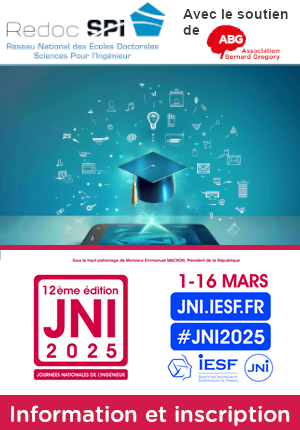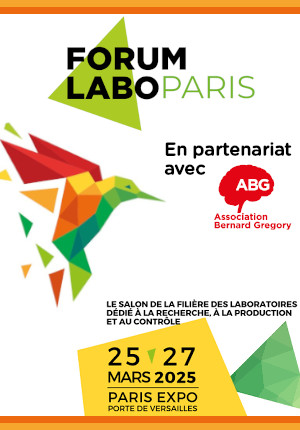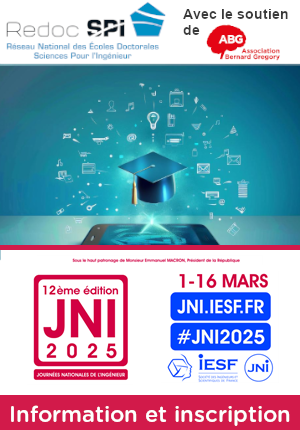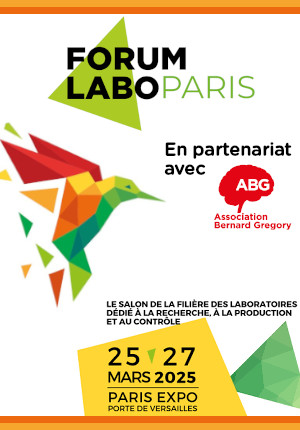Développement de nanobodies thérapeutiques ciblant le récepteur Guanylyl cyclase C // Development of therapeutic nanobodies targeting the Guanylyl cyclase C receptor.
|
ABG-128621
ADUM-61297 |
Thesis topic | |
| 2025-02-14 |
Université de Bordeaux
PESSAC - France
Développement de nanobodies thérapeutiques ciblant le récepteur Guanylyl cyclase C // Development of therapeutic nanobodies targeting the Guanylyl cyclase C receptor.
- Biology
nanobodies, cancer, thérapie, biochimie, récepteur, biologie structurale
nanobodies, cancer, therapy, biochemistry, receptor, structural biology
nanobodies, cancer, therapy, biochemistry, receptor, structural biology
Topic description
La guanylyl cyclase C (GC-C) est un récepteur intestinal qui joue un rôle essentiel dans l'homéostasie gastro-intestinale. Elle est impliquée dans la sécrétion des fluides, les processus inflammatoires et la tumorigénèse, ce qui en fait une cible attrayante pour les interventions thérapeutiques. Ce projet de doctorat vise à développer des nanobodies - des anticorps à domaine unique dérivés d'immunoglobulines de camélidés - ciblant le GC-C pour des études thérapeutiques et structure-fonction. Les nanobodies sont des outils innovants qui offrent plusieurs avantages par rapport aux anticorps conventionnels, notamment une grande spécificité, stabilité et une facilité de production, ce qui en fait des outils polyvalents dans la recherche biomédicale.
Les nanobodies ciblant le GC-C développés dans le cadre de ce projet offriront de multiples opportunités thérapeutiques telles que 1) l'inhibition de GC-C pour pallier le manque d'inhibiteur afin de traiter les maladies diarrhéiques liées à GC-C ou 2) l'activation du GC-C pour cibler le cancer colorectal primaire ou métastatique. En outre, les nanobodies, stabilisant diverses conformations, faciliteront l'obtention d'informations structurelles et fonctionnelles sur GC-C qui pourrait ouvrir la voie à la mise au point de nouveaux médicaments.
Le projet utilisera une combinaison de techniques biophysiques, de biologie structurale et de biologie cellulaire pour évaluer le potentiel thérapeutique et le mécanisme d'action de ces nanobodies. Ce projet interdisciplinaire a l'ambition d'intégrer des outils nanotechnologiques innovants à la médecine, contribuant ainsi à l'avancement des thérapies ciblées dans les maladies gastro-intestinales.
------------------------------------------------------------------------------------------------------------------------------------------------------------------------
------------------------------------------------------------------------------------------------------------------------------------------------------------------------
Guanylyl cyclase C (GC-C) is an intestinal receptor with a pivotal role in gastrointestinal homeostasis. It is involved in fluid secretion, inflammatory processes, and tumourigenesis, making it an attractive target for therapeutic intervention. This PhD project aims to develop nanobodies - single domain antibodies derived from camelid immunoglobulins - targeting GC-C for both therapeutic and structural-functional studies. Nanobodies are innovative tools offering several advantages over conventional antibodies, including high specificity, stability, and ease of production, making them versatile tools in biomedical research.
GC-C targeting nanobodies developed during this project will offer multiple therapeutic opportunities such as 1) GC-C inhibition to overcome the lack of GC-C inhibitor to treat GC-C related diarrheal-diseases or 2) GC-C activation to target primary or metastatic colorectal cancer. In addition, conformation-specific nanobodies will facilitate the obtention of structural and functional insights into GC-C that could pave the way for new drug development.
The project will use a combination of biophysical techniques, structural biology, and cell biology to assess the therapeutic potential and mechanistic action of these nanobodies. This interdisciplinary project has the ambition to integrates innovative nanotechnology tools with medicine, contributing to the advancement of targeted therapies in gastrointestinal diseases.
------------------------------------------------------------------------------------------------------------------------------------------------------------------------
------------------------------------------------------------------------------------------------------------------------------------------------------------------------
Début de la thèse : 01/10/2025
Les nanobodies ciblant le GC-C développés dans le cadre de ce projet offriront de multiples opportunités thérapeutiques telles que 1) l'inhibition de GC-C pour pallier le manque d'inhibiteur afin de traiter les maladies diarrhéiques liées à GC-C ou 2) l'activation du GC-C pour cibler le cancer colorectal primaire ou métastatique. En outre, les nanobodies, stabilisant diverses conformations, faciliteront l'obtention d'informations structurelles et fonctionnelles sur GC-C qui pourrait ouvrir la voie à la mise au point de nouveaux médicaments.
Le projet utilisera une combinaison de techniques biophysiques, de biologie structurale et de biologie cellulaire pour évaluer le potentiel thérapeutique et le mécanisme d'action de ces nanobodies. Ce projet interdisciplinaire a l'ambition d'intégrer des outils nanotechnologiques innovants à la médecine, contribuant ainsi à l'avancement des thérapies ciblées dans les maladies gastro-intestinales.
------------------------------------------------------------------------------------------------------------------------------------------------------------------------
------------------------------------------------------------------------------------------------------------------------------------------------------------------------
Guanylyl cyclase C (GC-C) is an intestinal receptor with a pivotal role in gastrointestinal homeostasis. It is involved in fluid secretion, inflammatory processes, and tumourigenesis, making it an attractive target for therapeutic intervention. This PhD project aims to develop nanobodies - single domain antibodies derived from camelid immunoglobulins - targeting GC-C for both therapeutic and structural-functional studies. Nanobodies are innovative tools offering several advantages over conventional antibodies, including high specificity, stability, and ease of production, making them versatile tools in biomedical research.
GC-C targeting nanobodies developed during this project will offer multiple therapeutic opportunities such as 1) GC-C inhibition to overcome the lack of GC-C inhibitor to treat GC-C related diarrheal-diseases or 2) GC-C activation to target primary or metastatic colorectal cancer. In addition, conformation-specific nanobodies will facilitate the obtention of structural and functional insights into GC-C that could pave the way for new drug development.
The project will use a combination of biophysical techniques, structural biology, and cell biology to assess the therapeutic potential and mechanistic action of these nanobodies. This interdisciplinary project has the ambition to integrates innovative nanotechnology tools with medicine, contributing to the advancement of targeted therapies in gastrointestinal diseases.
------------------------------------------------------------------------------------------------------------------------------------------------------------------------
------------------------------------------------------------------------------------------------------------------------------------------------------------------------
Début de la thèse : 01/10/2025
Funding category
Funding further details
Appel à projets - UB PhD Scholarships
Presentation of host institution and host laboratory
Université de Bordeaux
Institution awarding doctoral degree
Université de Bordeaux
Graduate school
154 Sciences de la Vie et de la Santé
Candidate's profile
Le laboratoire recherche un candidat motivé pour mener un projet de recherche dans un contexte pluridisciplinaire (biologie structurale et biologie cellulaire). Formation initiale en biochimie des protéines est fortement encouragé avec de préférence des connaissances en biologie structurale (Cryo-EM et NMR).
Sont éligibles uniquement des candidatures internationales, à savoir :
- des candidates ou candidats ayant obtenu (ou en cours d'obtention de) leur diplôme d'accès au doctorat (Master ou équivalent) dans un établissement à l'étranger
- des candidates ou candidats actuellement dans un Graduate Program de l'université de Bordeaux, inscrits en deuxième année de Master et ayant obtenu leur diplôme d'accès au Master dans un établissement à l'étranger
Seront prises en compte uniquement les candidatures soumises sur la plateforme suivante : https://aap.u-bordeaux.fr/ et avant le 17 mars à 23h59 (GMT Paris).
Un guide de candidature ainsi que la liste des documents à soumettre sont disponibles sur la plateforme.
Pour toute question, veuillez contacter : internationalisation.doctorat@u-bordeaux.fr
The laboratory is looking for a motivated candidate to lead a research project in a multidisciplinary context (structural biology and cell biology). Initial training in protein biochemistry is strongly encouraged , with preferentially basic knowledge in cryo-EM and/or crystallography. The UB PhD scholarship program is open to international candidates only, which means: - candidates holding (or currently enrolled in) a national level master's degree or another degree conferring master's status from a foreign institution - candidates currently in a Graduate Program, enrolled in second year of Master at the University of Bordeaux, and holding a degree from a foreign institution We will only consider applications submitted on the following platform: https://aap.u-bordeaux.fr/ and prior March 17, at 11:59pm (GMT Paris). A guide on how to apply as well as the list of documents to submit are available on the platform. For any question, please contact: internationalisation.doctorat@u-bordeaux.fr
The laboratory is looking for a motivated candidate to lead a research project in a multidisciplinary context (structural biology and cell biology). Initial training in protein biochemistry is strongly encouraged , with preferentially basic knowledge in cryo-EM and/or crystallography. The UB PhD scholarship program is open to international candidates only, which means: - candidates holding (or currently enrolled in) a national level master's degree or another degree conferring master's status from a foreign institution - candidates currently in a Graduate Program, enrolled in second year of Master at the University of Bordeaux, and holding a degree from a foreign institution We will only consider applications submitted on the following platform: https://aap.u-bordeaux.fr/ and prior March 17, at 11:59pm (GMT Paris). A guide on how to apply as well as the list of documents to submit are available on the platform. For any question, please contact: internationalisation.doctorat@u-bordeaux.fr
2025-03-17
Apply
Close
Vous avez déjà un compte ?
Nouvel utilisateur ?
More information about ABG?
Get ABG’s monthly newsletters including news, job offers, grants & fellowships and a selection of relevant events…
Discover our members
 Institut Sup'biotech de Paris
Institut Sup'biotech de Paris  CESI
CESI  ONERA - The French Aerospace Lab
ONERA - The French Aerospace Lab  Aérocentre, Pôle d'excellence régional
Aérocentre, Pôle d'excellence régional  SUEZ
SUEZ  ADEME
ADEME  Généthon
Généthon  ANRT
ANRT  Institut de Radioprotection et de Sureté Nucléaire - IRSN - Siège
Institut de Radioprotection et de Sureté Nucléaire - IRSN - Siège  MabDesign
MabDesign  TotalEnergies
TotalEnergies  MabDesign
MabDesign  Laboratoire National de Métrologie et d'Essais - LNE
Laboratoire National de Métrologie et d'Essais - LNE  Groupe AFNOR - Association française de normalisation
Groupe AFNOR - Association française de normalisation  CASDEN
CASDEN  Tecknowmetrix
Tecknowmetrix  Nokia Bell Labs France
Nokia Bell Labs France  Ifremer
Ifremer  PhDOOC
PhDOOC










